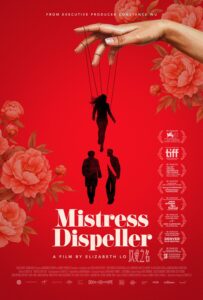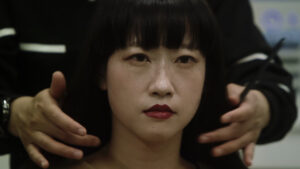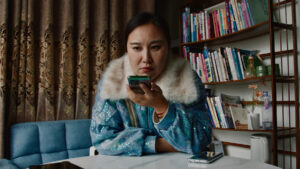Interview with “Mistress Dispeller” Director Elizabeth Lo
Written by: Christopher Llewellyn Reed | October 24th, 2025

The documentary Mistress Dispeller premiered at the 2024 Venice Film Festival (I reviewed it out of Toronto) and is now finally, in 2025, coming out in theaters via Oscilloscope (released October 22 in New York and today, October 24, in Los Angeles). In the movie, Lo (Stray) examines the titular Chinese profession, where someone (usually a betrayed wife) hires an outside party to break up an extramarital dalliance, With remarkable access to her subjects and a meticulous eye for composition, Lo crafts a riveting portrait of a family under stress and tracks their emergence from crisis. I recently had the chance to chat with Lo by Zoom, and here is that conversation, edited for length and clarity.
Christopher Llewellyn Reed: Your film premiered in 2024; I saw it at the 2024 Toronto International Film Festival. Here we are in 2025 and it’s finally coming out. What has that journey been like, getting it from festival release to theatrical distribution?
Elizabeth Lo: It’s been incredible. It was always my goal to travel the world with this film to see how different cultures and countries responded to the premise and the way the story unfolds within it. And it’s been a really rewarding experience to see that these themes of love and betrayal resonate universally, even though different cultures will have different questions and points of confusion about why people are behaving the way that they do. And that’s been really interesting for the last year.
 CLR: I’m going to quote you to yourself now. In the press notes for the film, you write: “In an era of increasing polarization between the US and China, it was important to me as a Hong Kong citizen to make a documentary film that bridges this divide.” You could have done that in a variety of ways. Why did you choose this topic of the mistress dispeller with that goal in mind?
CLR: I’m going to quote you to yourself now. In the press notes for the film, you write: “In an era of increasing polarization between the US and China, it was important to me as a Hong Kong citizen to make a documentary film that bridges this divide.” You could have done that in a variety of ways. Why did you choose this topic of the mistress dispeller with that goal in mind?
EL: Well, I knew I wanted my second feature after Stray to be set in mainland China as a way for me to personally get to know this culture and civilization that is unfamiliar to me as a Hong Kong citizen, but also obviously close to my ancestry. But I also knew that whatever I set in mainland China, I wanted it to be subject matter that would help audiences around the world relate to regular Chinese citizens. And so I felt like love would be the best kind of setting in which people are showing up with their most wounded selves, and it’s their most intimate unguarded place that they’re revealing and that love is such a universal emotion. Desire doesn’t have borders to it. And I didn’t want to create a film that would further push China to the edges of our imagination of what this country is and how people live within it.
CLR: On the other hand, it is very specific to China with this profession of the mistress dispeller. So it may be universal, but there’s also great specificity here. How did you first hear about mistress dispellers?
EL: So I had actually watched Zhang Yimou’s Raise the Red Lantern, which is about four wives competing for the affections of a patriarch within a household in order to survive. And I thought it would be really interesting to transpose a premise like that to modern-day China and see what it is like to navigate society as a woman today. And the modern-day equivalent felt like mistresses. So, I was researching mistresses in China and came across the mistress-dispelling phenomenon. Meeting Teacher Wang, the mistress dispeller, during our scouting shoot, really changed my emphasis and focus. Instead of it just being about women’s experiences in China, it now became more inclusive. It was about how men and women are figuring love out within this cultural setting and using an industry that has flourished because of the culturally specific premise.
The theories that I’ve come up with for the difference between the West and the East and its approach to something like betrayal or infidelity is that in the West, if somebody found out that their spouse was cheating on them, divorce or direct confrontation might be the first step. But in Asia, or at least in China, the impulse to preserve the family is so strong and so woven into the fabric of Chinese culture that sacrificing one’s personal desires, or the temporary happiness derived from an extramarital affair, sacrificing that for the perceived greater good of the family is much more ingrained. There is also the importance of saving face and approaching conflict resolution in a way that is not all guns blazing. It’s much more subtle, it’s much more subdued and pragmatic and roundabout. And I think that is specific to Asian culture and why mistress dispelling is able to function in this society.
CLR: Speaking of saving face, you’re putting your subject’s intimate lives on the screen in pretty direct ways, ways that expose how they’re feeling, with a lot of uncomfortable details of their lives. So how did you pitch this to the folks in your film and then convince them to keep filming as things got perhaps increasingly embarrassing or intimate? Teacher Wang I can understand, but how about everyone else?
EL: So at the beginning, we never directly approached any of Wang’s clients. It was always Wang and her business partner who would approach these prospective clients. And what they persuaded them to be a part of was a broader portrait of modern love in China. And, I think, especially with the wives, what she said was their reason to participate and expose their lives in this public way was so that if they share this, other women who are in similar situations can benefit and figure out how to navigate this kind of circumstance. And so she’s appealing to, out of her hundreds of clients, the handful of women who are so altruistic or open to that suggestion that they would be open to participating in the film.

And with the husband and the mistress—Fei Fei—we kept our direct heart-to-hearts with them to a bare minimum throughout the filming process, because we didn’t want to inadvertently spill the beans on the process and mess up Wang’s strategy. And so at the end, in our master interview with Fei Fei, we asked her, “Why did you choose to participate in this film and why would you keep staying?” Because everybody only agreed to a few days of filming at the start. And what she said to us—I thought it was so striking—was that she initially thought that the documentary would be a gift from the husband to her, and it would be a document of their love story in which she was the central character, and she stayed on despite how things were unraveling because she kept wanting, herself, to know how things would turn out. On a deep level, she did not think that she would lose to the wife. And I think that hope in her was what kept her going. And also, she’s obviously an incredibly unselfconscious and generous person to still choose to remain featured at the end of this process.
I think the husband is also responding to the situation and wanting to please his wife. And also he does come to see Wang as someone who’s going to help him out of this predicament, out of the mess that he has found himself in.
CLR: I really like that heart-to-heart between Fei Fei and the wife at the end. That’s a really moving moment. This movie is exquisitely photographed with scenes that feel as carefully crafted as what you might see in a fiction film, where you have complete control over the environment. How much control in the moment did you exert over staging and design? Because it really often feels like you’ve been able to move the camera around and choose great angles.
EL: We had very little control over our environment, which is why I chose to use the Alexa Mini cameras, which are usually used on fiction-film sets instead of documentaries because they’re so bulky. I knew that I wanted these domestic spaces to appear central enough and lush enough that audiences would be willing to stay for minutes-long conversations in static frames that are unfolding in front of them.
We always shot with a two-camera setup. I took this stillness from Chantal Akerman’s Jeanne Dielman as an inspiration for how to film these domestic scenes. What that allowed us to do was to walk away from the camera. Once we figured out where the conversations were taking place and set up these two cameras, all of the crew would leave the room, and we would monitor them from the next room. So this is how the participants were able to be as unselfconscious as possible despite the presence of the cameras.
There were instances early on in filming when we tried to light things, but I was the DP [Director of Photography] and I don’t work with lights. We found that when I did try to set up lights, it actually made things look less real than how the natural setting was. So we quickly decided not to use any kind of artificial lights.
CLR: Well, the Alexa Minis are also pretty sensitive in low-light situations, so that helps. How did you choose the interstitial musical moments? It was something I immediately responded to, watching the film. You have Puccini’s “O mio babbino caro,” a French song—“Hardcore”—by Odezenne, and more. What inspired those choices?
EL: Initially, when we were pitching this film and fundraising for it, we had put a track of Americana/‘50s love songs over our protagonist. But what my editor—Charlotte Munch Bengtsen—and I found was that that music really undercut and made a farce of their lives and their emotional states. And so we decided to go in the opposite direction and use this really iconic Puccini song with its resonant themes of betrayal and love, which is also an homage that we hope will evoke for audiences those grand, epic romances that you associate with A Room with a View or Jane Austen adaptations or E.M Forster adaptations. That same sensibility and gravitas that you take with those protagonists in Europe or England, you are bringing to this middle-class couple in the heartland of China and you’re taking their love story seriously no matter how muted and mundane it is and ostensibly not that much happens over the course of these four months, and everything is very repressed and simmering under the surface. We wanted that music to help you take them seriously.

Going into it, I always knew that the score would be very international and that it would be unexpected because I love films like Marie Antoinette by Sofia Coppola when she uses New Order under a period piece or even Spike Lee when he opens Inside Man with a Bollywood track. I love that kind of not caring where the music is coming from; this music applied to this situation can make it feel unexpected and also international and universal, with all the emotions that they’re going through. That Odezenne piece, I encountered it as I was researching what music to put under these kinds of interstitial sequences. And when I heard that piece, it just invoked all these feelings from high school where it was indie music where you’re full of yearning and longing.
And I felt like in that moment ,where the husband is having to leave his mistress for the last time, he is probably feeling the same kinds of emotions that one does in one’s youth and that those feelings don’t go away. So that was the thinking behind the music. And I worked with Charlotte on the Interstitials to not be redundant, so that the formula of this contraction and expansion between the larger societal vignettes and the wilderness scenes with the core love story wouldn’t be repetitive, that every time we did one, there would be meaning and significance.
CLR: For how long did you film? And have things changed in this profession over time? Is it still going strong? Is it growing?
EL: We started filming in 2021 and we wrapped filming in 2023. And the last we checked in with Teacher Wang, she’s still going strong. Her business is still doing well. Teacher Wang tells us that she thinks the state occasionally starts to censor words, like sometimes the words “mistress dispelling” can become a sensitive point.
CLR: Is that because the state doesn’t want to admit that their ostensibly happy families have mistresses? What would motivate that?
EL: I don’t know what the motivation is so I can’t speak to that, but I do see how this industry is largely unregulated and ethically murky.
CLR: Thank you so much, Liz, for chatting with me.
EL: Thank you!

